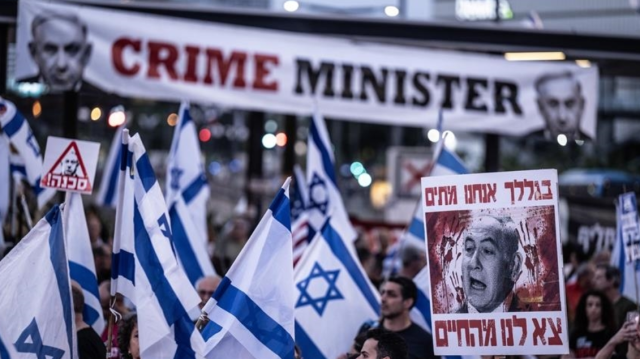

File photo
Israelis demonstrate in Tel Aviv, Haifa, Herzliya, and Caesarea, according to local media
Thousands of protesters demonstrated in several Israeli cities on Saturday evening, demanding an immediate hostage swap deal with Palestinian factions in the Gaza Strip.
Thousands protested in downtown Tel Aviv, urging the government led by Prime Minister Benjamin Netanyahu to finalize a deal that would lead to the release of Israeli hostages in Gaza, the state-run broadcasting authority KAN reported.
Israeli opposition leader Yair Lapid shared photos of himself on X taking part in protests.
“Go to Cairo (negotiations) yourself, don't send anyone else, finalize the deal now,” Lapid urged Netanyahu.
Israeli daily Yedioth Ahronoth reported that demonstrations also took place in Haifa, Herzliya, and Caesarea.
A Hamas delegation arrived in Cairo on Saturday to resume talks on a hostage swap and a cease-fire in Gaza, which have been stalled due to Netanyahu's refusal to give up control of the Philadelphi Corridor on the Gaza-Egypt border and the Rafah crossing. Several press reports have accused Netanyahu of sabotaging the talks out of fear for his political future.
- Hamas getting update from Egypt
The Hamas delegation will meet with Egyptian officials to get an update on the latest developments in the cease-fire talks, a Palestinian source familiar with the situation told Anadolu on Saturday, requesting anonymity.
In a statement, Hamas spokesman Izzat al-Rishq confirmed the delegation's visit, saying the movement remains committed to the July 2 proposal backed by US President Joe Biden.
He said the Hamas delegation, led by Khalil Al-Hayya, is visiting Cairo at the invitation of Egyptian and Qatari mediators to review the outcome of recent negotiations in the city.
The spokesman sought to put "pressure on the occupation (Israeli government) to obligate it to stop obstructing reaching an agreement."
This visit comes two days after an Israeli security delegation and a US team arrived in Cairo.
Both delegations are taking part in cease-fire talks, but the chances of a successful outcome appear slim due to Netanyahu's insistence on continuing a military offensive in Gaza and maintaining control over strategic areas such as the Philadelphi Corridor on the Egyptian border and the Netzarim Junction, which separates Gaza's northern and southern regions.
Israel has continued its offensive on the Gaza Strip after launching it following an attack by the Palestinian group Hamas last Oct. 7, despite a UN Security Council resolution calling for an immediate cease-fire.
The onslaught has resulted in over 40,300 Palestinian deaths, mostly women and children, and over 93,300 injuries, according to local health authorities.
An ongoing blockade of Gaza has led to severe shortages of food, clean water, and medicine, leaving much of the region in ruins.
Israel faces accusations of genocide at the International Court of Justice, which has ordered a halt to military operations in the southern city of Rafah, where over one million Palestinians had sought refuge before the area was invaded on May 6.
#Hamas delegation
#hostage swap deal
#Israeli protesters
